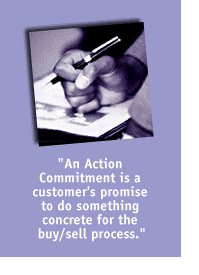
Why Am I Here?
| Продажи | ||||
| Sales.com | ||||
| Preparing... | ||||
by Stephen E. Heiman and Diane Sanchez with Tad Tuleja
Every sales call should be focused on a Single Sales Objective, that is, the anticipated result you expect to achieve from a particular call at a particular time. But the only way you get to that objective is to secure incremental achievements along the way - to make sure you come out of each and every sales call closer to that objective than when you went in. To achieve that, you need to set near-term accomplishments for each call. We call these near-accomplishments Action Commitments.
Let's head off a potential misunderstanding right at the outset. We use the term Action Commitment in a precise but somewhat unusual manner. It's not something that you will do or commit to. An Action Commitment is a customer's promise to do something concrete for the buy/sell process.
Because such a commitment obviously meets a selling objective (it moves things forward), and because often your involvement has made it possible, it's temping to think of the promise as your accomplishment. That's fine, as long as you remember that the fulfillment of that promise is your customer's responsibility. If she doesn't meet it, it doesn't matter how "committed" you are. When you're truly getting commitment, you and the customer are walking together toward the Win-Win scenario. In this sense, every sales call has the same goal: to get commitment from your partner in the process to do something.
It may seem obvious to you that a seller ought to have a goal in mind before she enters a sales call. Salespeople are result-oriented. Working with departments and sales manages, most professional salespeople constantly have their eye on some goal. They're constantly setting levels of achievement for themselves that will make them the top producer for this

quarter or the branch commission leader or Salesperson of the Year. But our research shows that in spite of this results-oriented attitude, most salespeople do not set clear and realistic goals for themselves from one sales call to another. Even among highly experienced sellers, annual objectives and career goals may be defined clearly enough, but Tuesday afternoon's accomplishment remains uncertain. When setting your Action Commitment, make sure you avoid these three common problems.
1. Too General. Unless an accomplishment is specific, tangible and measurable, it's very easy for the seller to leave the call not knowing whether or not it has been achieved. A good Action Commitment is a benchmark, and if that benchmark is something as vague as "moving the process forward," you may be uncertain about how far, or in what direction, you've come when the call is over.
2. Unrealistic. Ask any 10 salespeople what they want to get out of the next sales call they're going to make, and nine will say "the order." In certain types of selling, such as retail floor selling or selling where the typical sticker price is low, that's not always unreasonable. But in most kinds of selling it is.
3. Salesperson-driven. When faced with the task of stating their sales goals, most professionals focus exclusively on what they will do rather than on what the potential customer must do. This is natural because most sales professionals are still being told that they should stay in constant control of the sale and never let it fall into the enemy's (that is, the customer's) hands. But the only way you deliver results is to start with the customer, and that means involving him or her in moving things forward.
You should never end a sales call without getting an Action Commitment from the customer. By committing to action, and only by committing to action, do your customers demonstrate their belief in a Win-Win result.
Adapted from The New Conceptual Selling Stephen E. Heiman, Diane Sanchez with Tad Tuleja (c) 1999 by Miller Heiman, Inc., All rights reserved with permission of Warner Books. Inc.